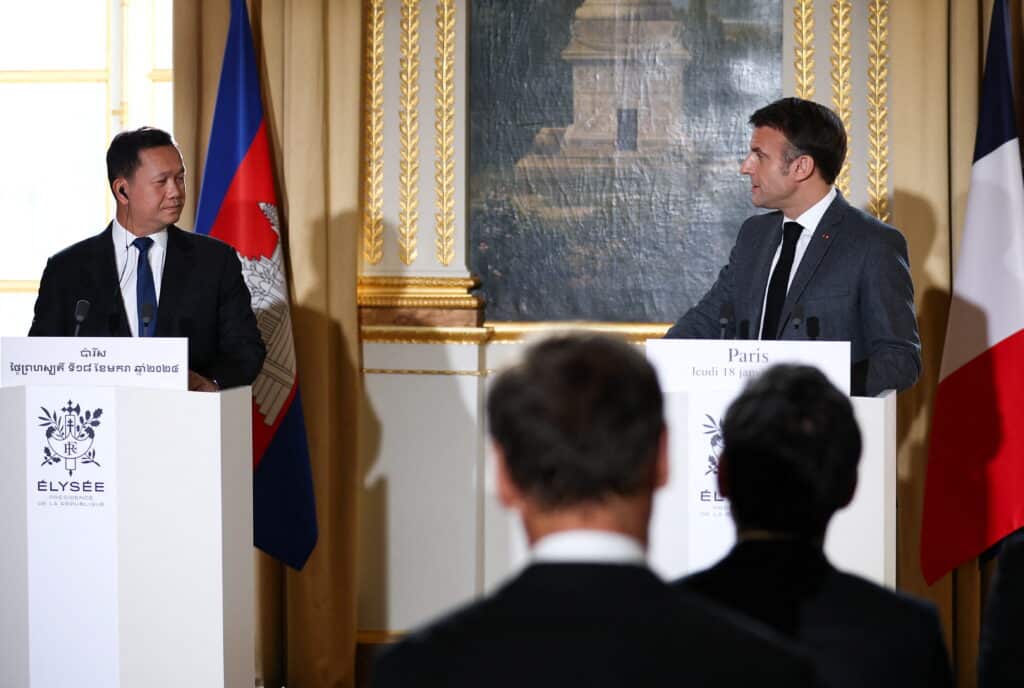By Prom Thary
Hun Manet took over as the prime minister of Cambodia after his father, Hun Sen, transferred power to him in October 2023. Since then, he has actively engaged in diplomatic relations, focusing on economic diplomacy. But Manet is in a challenging position, as Cambodia is projected to graduate from its least developed country status by 2027 and aims to achieve upper-middle-income status by 2030.
Foreign direct investment (FDI) is critical for economic growth in developing countries like Cambodia. Former Prime Minister Hun Sen— a strong political and economic ally of China — led Manet on his first visit to China, where he signed agreements to increase FDI in construction and manufacturing. But Manet is actively making new friends on the international stage in order to reduce reliance on a single country and diversify economic partnerships to maintain sustainable economic development.
When the new administration took office, Cambodia’s strategic push towards France was expected to deepen its political and economic ties with the European Union after the bloc partially suspended its preferential trade agreement with Cambodia under the Everything but Arms scheme in 2020. But that has not dampened the US$159 million in traffic between Cambodia and France in the first four months of 2024. Manet is also urging deeper industrial investment in digital technology, aviation, tourism, trains and renewable energy.
Economic diversification and increasing competitiveness by attracting FDI, reviewing foreign diplomatic relations and rebalancing international relations is a critical priority for Cambodia. The government’s efforts towards this objective has attracted Toyota to establish a new factory. Cambodia upgraded its 70-year-old diplomatic ties with Tokyo to a comprehensive strategic alliance in 2023, placing Japan at the centre of its foreign policy and counterbalancing China’s influence.
Manet also dispatched a delegation to South Korea after President Yoon Suk-yeol conveyed interest in enhancing cooperation in trade, investment and the digital environment. The two leaders signed six documents at a bilateral summit, including renewing a framework arrangement to increase South Korea’s loans to Cambodia.
The loan amount will be doubled from US$1.5 billion between 2022–2026 to US$3 billion from 2022–2030 under the Economic Development Cooperation Fund. Cambodia is also looking into establishing a Special Economic Zone exclusively for South Korean companies to more effectively attract investment projects. Cambodia now ranks first in ASEAN and number three among the 20 fastest-growing economies in Asia, with a growth rate of 6 per cent in 2024. Through its participation in RCEP and a range of other FTAs, Cambodia anticipates further export growth and foreign direct investment.
Due to these agreements and their potential to spur economic growth, Cambodia authorised a US$2.5 billion dollar fixed asset investment in the first four months of 2024, estimated to create 130,000 jobs. But the response to the inflow of FDI has been shaky, with the economy remaining vulnerable due to its volatile growth base, reliance on low-skilled labour, poor infrastructure and logistics and strong dollarisation, which threatens its current monetary policies.
Criticisms of the increase in FDI are also growing due to the experience of Chinese investment in Sihanoukville. The working environments of the Chinese-owned companies are unhealthy, with long working hours, poor health and safety standards and numerous accidents. Only a small number of employees have formal contracts and most work overtime. Public perception is that Japan is more moral and compliant with health and safety standards.
In terms of business perception, Cambodia ranked 119th out of 130 countries. Manet’s task will be to improve Cambodia’s ease of doing business and address its low ranking.
Cambodia’s economic goals are ambitious yet achievable. The government aims to continue attracting high-quality FDI to diversify economic partnerships that will contribute to its development. To sustain this growth, Manet has launched the Pentagonal Strategy Phase I, which serves as a roadmap for Cambodia to become a high-middle-income country by 2030 and a high-income country by 2050.
Cambodia must concentrate on enhancing its business and investment climate if it hopes to draw in high-quality FDI. Investing in infrastructure, promoting environmental and social responsibility, stimulating innovation and technology, bridging the skills gap, strengthening governance and anti-corruption activities and developing partnerships between public and private sectors are some strategies to achieve this.
Mom Mit is a graduate student in the Strategic and Innovative Development Department at the Financial University under the Government of the Russian Federation, Moscow.
Prom Thary is a PhD Scholar in Political Science at RUDN University, Moscow. He holds a master’s degree in political science from Saint Petersburg State University, Russia, and a master’s degree in law from UME University, Cambodia. He serves as a civil servant at Cambodia’s Ministry of Interior.
This article first appeared on East Asia Forum: https://eastasiaforum.org/2024/06/28/hun-manet-fishing-for-increased-fdi/
